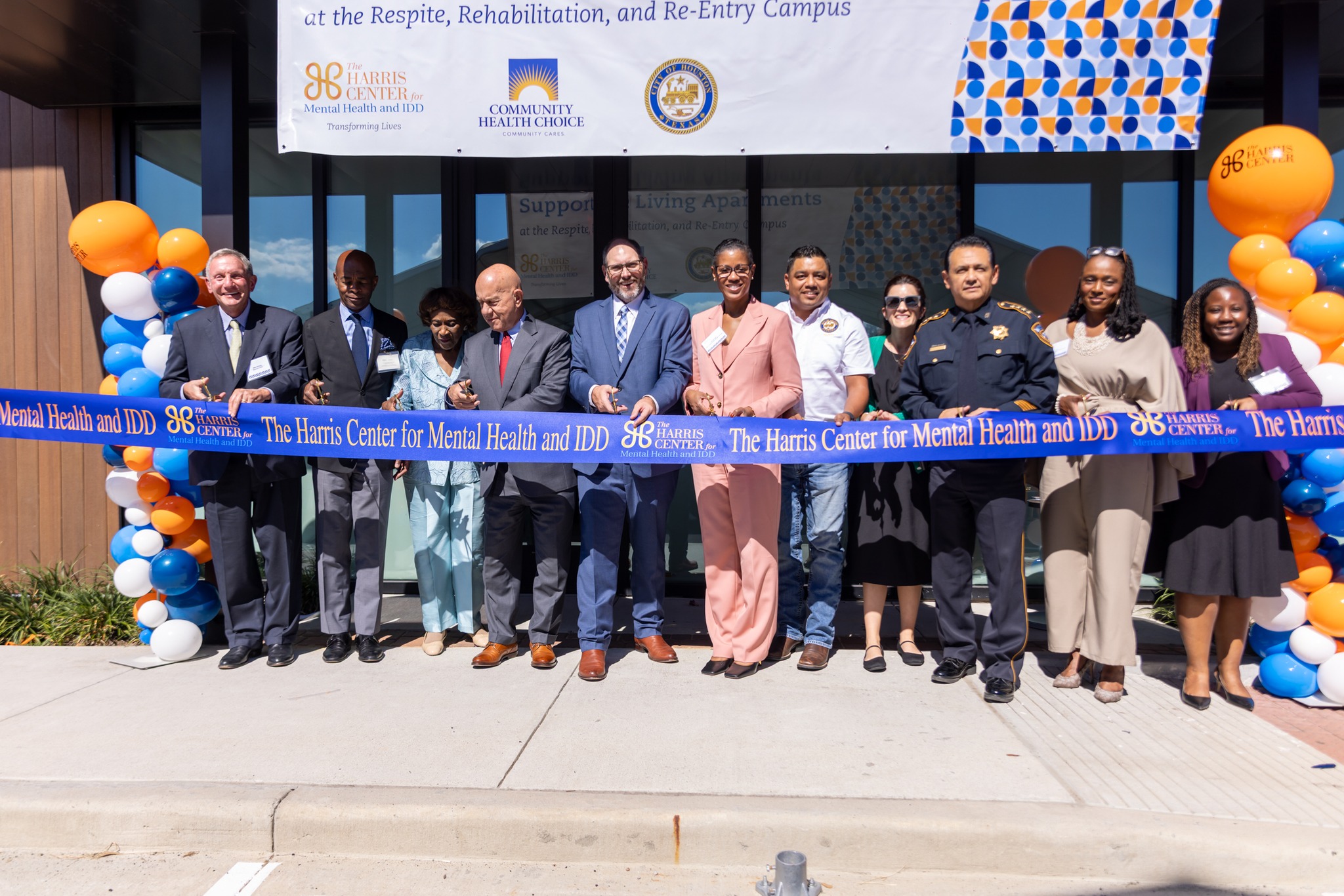
New Supportive Living Apartments in Houston Offer Hope and Housing for Harris County Residents with Serious Mental Health Needs
A new 26-unit apartment development in southeast Houston is changing lives by addressing a critical intersection: homelessness, mental illness, and the need for long-term recovery support. The Harris Center, which serves all of Harris County, developed the project in partnership with the City of Houston, Community Health Choice, and the Texas Health and Human Services Commission (HHSC). The Harris Center for Mental Health and IDD officially opened its new Supportive Living Apartments last week during a ribbon-cutting ceremony held on October 13 at the agency’s Respite, Rehabilitation & Reentry Campus.
These Supportive Living Apartments are not just housing—they are places of healing, stability, and transformation. Designed for individuals with severe mental illness and substance use disorders (SUD), the complex pairs permanent housing with wraparound behavioral health services, case management, and peer support, all delivered onsite.
More Than Shelter: A Pathway to Independence
The $12.5 million initiative represents a growing movement across the Greater Houston area and the nation to shift from reactive crisis response to proactive care that addresses the root causes of homelessness and psychiatric instability.
Residents at the new development have immediate access to a range of mental health services co-located at The Harris Center’s broader Respite, Rehabilitation & Reentry Campus. This setup eliminates transportation barriers and strengthens continuity of care—a key factor in long-term recovery and community reintegration.
Mobile Sidebar Ad
“By combining affordable homes with behavioral health care and wraparound supports, we are not just providing shelter, we’re helping individuals rebuild their lives,” said Mike Nichols, Director of the City of Houston Housing and Community Development.
Lisa Wright, President and CEO of Community Health Choice, emphasized the long-term value of this model: “Permanent supportive housing is more than a response to homelessness, it’s an investment in public health, safety, and human potential.”
Addressing a Crisis in Harris County
According to the National Alliance on Mental Illness (NAMI), more than 320,000 adults in the Greater Houston area live with a serious mental health condition. In Harris County alone, nearly one-third of adults experiencing homelessness report a mental illness diagnosis, and the lack of supportive housing can often result in cycling between emergency rooms, jail, or the streets.
The Harris Center’s new development is a direct response to this gap in services. It builds on growing evidence that supportive housing significantly reduces hospitalizations, emergency service use, and incarceration rates. A widely cited study by the Corporation for Supportive Housing found that individuals placed in supportive housing are 40% less likely to be hospitalized and 50% less likely to be incarcerated than those who remain unhoused.
Wayne Young, CEO of The Harris Center for Mental Health and IDD, framed the initiative as a model for how Houston can continue to lead with compassion and evidence-based solutions. “These new apartments are more than just walls and doors—they are places of safety, dignity, and recovery that will help people rebuild their lives and reconnect with community,” he said.
A Collective Commitment to Recovery
The City of Houston committed $4.5 million in federal housing funds to help bring this vision to life, signaling a strong public investment in mental health and homelessness solutions. The site’s integration into The Harris Center’s campus allows for a continuum of care that includes crisis respite, rehabilitation, and reentry services—creating a supportive ecosystem rather than isolated interventions.
Mobile Sidebar Ad
“This is what progress looks like—partners coming together to ensure no Houstonian is left on the streets without hope or help,” said Mayor John Whitmire. “These new apartments represent more than housing; they reflect our city’s commitment to dignity, safety, and opportunity for every resident.”
As the city grapples with rising mental health needs and a lack of affordable housing, initiatives like the Supportive Living Apartments offer a blueprint for how local partnerships, data-driven policy, and person-centered care can help people not just survive—but truly heal and thrive.
For more information about The Harris Center’s services and the Supportive Living Apartments, visit theharriscenter.org.
 Tiffany Krenek has been on the My Neighborhood News team since August 2021. She is passionate about curating and sharing content that enriches the lives of our readers in a personal, meaningful way. A loving mother and wife, Tiffany and her family live in the West Houston/Cypress region.
Tiffany Krenek has been on the My Neighborhood News team since August 2021. She is passionate about curating and sharing content that enriches the lives of our readers in a personal, meaningful way. A loving mother and wife, Tiffany and her family live in the West Houston/Cypress region.

